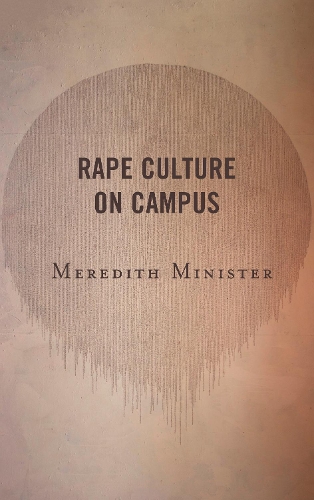
Rape Culture on Campus
(Hardback)
Available Formats
Publishing Details
Rape Culture on Campus
By (Author) Meredith Minister
Bloomsbury Publishing PLC
Lexington Books
15th September 2018
United States
Classifications
Professional and Scholarly
Non Fiction
Violence and abuse in society
Counselling and care of students
Higher education, tertiary education
Religious instruction
Educational administration and organization
371.782
Physical Properties
Hardback
184
Width 161mm, Height 240mm, Spine 20mm
435g
Description
Rape Culture on Campus explores how existing responses to sexual violence on college and university campuses fail to address religious and cultural dynamics that make rape appear normal, dynamics imbedded in social expectations around race, class, gender, sexuality, and disability. Rather than dealing with these complex dynamics, responses to sexual violence on college campuses focus on implementing changes in one-time workshops. As an alternative to quick solutions, this book argues that long-term classroom interventions are necessary in order to understand religious and cultural complexities and effectively respond to this crisis. Written for educators, administrators, activists, and students, Rape Culture on Campus provides an accessible cultural studies approach to rape culture that complements existing social science approaches, an intersectional and interdisciplinary analysis of rape culture, and offers practical, classroom-based interventions.
Reviews
For those of us exhausted by the ineffectual and insincere efforts to contain the problem of sexual assault on our college and university campuses, Meredith Ministers Rape Culture on Campus is a welcome reprieve. Ministers book is written for an audience of academics, in our native language (that of Bourdieu, Edelman, and Ahmed), but recognizes this audience as one deeply in need of both analytical and pedagogical practices that resist rape culture. To this end, Minister deploys the work of feminist, womanist, queer, crip theorists to re-frame the issue, one that is all too often reduced to compensatory damages. Using her background in Religious and Theological studies, Minister effectively situates the problem as an outgrowth of the cultures of purity and law enforcement that remain ignored. Coercion, sexism, and religion, she argues, maintain the culture of violence that animates rape culture on campus. Beyond her astute assessment of the problem, Minister provides her readers with concrete approaches to institutional policies and pedagogical practices that offer a vision of higher education that can not only prevent, but resist the foundational and practical entrenchment of rape culture. For anyone concerned about their students, survivors of sexual assault, and the integrity of institutions of higher education, Rape Culture on Campus is essential reading material. -- Sara Moslener, Central Michigan University
Author Bio
Meredith Minister is assistant professor of religion at Shenandoah University
